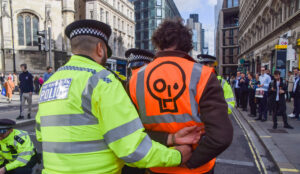The saboteur arrived before the protest. A young man in a tracksuit stood alone in the middle of Trafalgar Square, holding an orange sign that read: “Just ligma bosack.” I assumed it was a puerile piece of counter-protest, but it wasn’t even that. He was one half of a pair of vloggers who’d come to infiltrate and undermine the demonstration, all for prank-ish YouTube content. It was a bathetic start to the supposed centrepiece of Just Stop Oil’s autumn campaign: a month of protest during which almost 600 people have been arrested in 21 days.
This one lasted barely 21 minutes. A group of 50 centipeded past Nelson’s Column, some in Berghaus fleeces, some in moth-eaten donkey jackets, and all in hi-viz orange vests. Fewer than half of them, the “arrestables”, took to the road at the speed of a hearse; the rest remained on the pavement shouting support. And the moment they hit Whitehall, the police began to pick them off. The entire column was kettled onto the pavement, each orange beset by four or five yellows: wrestled, handcuffed and scooped into the waiting vans. The police worked from back-to-front, leaving the dwindling vanguard of the column to pace resolutely on, like captured admirals walking the plank. One woman on the pavement was crying, cursing the police, cursing the burning planet. But those under arrest were placid, serene, unblinking. They lay there quietly as the police took their details and unbuckled their watches into evidence bags.
Eventually, the only person left was a tiny old woman, still clutching her banner, and shuffling down the street. “Is there anything we can do to make you leave the road?” the police asked. She didn’t reply. “Gentle,” someone shouted as they swarmed her too. “She’s 80 years old!” “There’s plenty more people to be arrested,” one of the organisers called from the touchline. “This is not going to stop.” The combination of farce, dauntlessness and misallocated courage was unmistakable. After months of background hibernation — occasional snooker stunt aside — Just Stop Oil are back. Today, tomorrow, and the day after, they are repeating the above process, churning phalanx after phalanx into the rough embrace of the Metropolitan Police.
This is the radical fringe of the climate movement, which will come to define the coming decade of politics, if not the century. It’s aiming at a political revolution. But for now, it still sits somewhere in a Venn diagram of risible-meets-despised in the collective mind. First there was Extinction Rebellion (XR), which briefly captured the public mood before squandering it in a symbolic clash between working-class commuters and middle-class activists at Canning Town Tube. Then Insulate Britain emerged as an extreme splinter, dissatisfied with the slow progress of XR. Finally, defeated on the motorways of Britain, it morphed again. Just Stop Oil is the latest phase of evolution: its nimblest, most creative and worthiest form yet.
There is overlap between the groups — one woman in Trafalgar Square confides that she’s there in breach of contempt of court charges dating from the Insulate Britain protests two years ago. But each name-change has been accompanied by a detectable lurch in timbre. XR’s 2019 protests were comparably joyful, colourful, carnivalesque. Their successors strike a more militant mood. You can read the difference in the logos. XR’s: a jagged hourglass; a stop sign. “Time is running out.” Just Stop Oil’s: a weeping, staring, chop-fallen skull. “This is humanity’s deathly future.”
Between them these groups have made the threat of interrupted football fixtures, Heinz-splattered artwork and choked highways a new part of daily life. But they remain outside of politics, at best a parasitical feature of public debate. And, like any other radical movement of our time, they are an eccentric receptacle for wayward political anger.
This round of marches has been in the works for months, and JSO recruited hard in anticipation. On a dark and blustery October night, I went along to a welcome meeting, held in a cinderblock discussion space just off Brick Lane called Newspeak House. There were about 100 perched on secondary-school chairs, ready, or at the very least willing, to join JSO’s merry men.
Here such climate fears are mobilised; here they are put in uniform. The star speaker was Roger Hallam, Extinction Rebellion co-founder and Just Stop Oil’s in-house eschatalogue. He was there to tell us how bad it all is — in fact how it’s much worse than we can possibly believe — all delivered in his distinctive rambling, potty-mouthed, and wilfully apocalyptic rhetorical style. “It’s not gonna be a choice between it being ok and it being shit; it’s a choice between it being shit and it being so fucking shit you can’t possibly imagine!” The scroll of doom he unfurls is essential to understanding this movement. In 1968, radicals were told to take their desires for reality. Now, they take their nightmares for prophecy.
Hallam leans heavily on the 20th-century horror imaginary for his figurative conjurings. The Holocaust, the Cambodian genocide, atrocities in the Congo — they’re as nothing compared with the moral crime and mass slaughter our political elites are carrying out right now. This religious imagery — Hallam’s mother was a Methodist preacher — is now the lingua franca of the movement. They too talk of “genocide”, even of “reckoning”. We have sinned against our planet, and now we must be punished. Perhaps, as the Christian climate scholar Catherine Keller has written, only “theology… articulates what unconditionally matters”.
Hallam’s showstopper claim is that if we breach two degrees of warming above pre-industrial averages this century, “one thousand million” people will die. This is the end for everyone, everywhere, and animals too. The “sixth extinction” is already underway.
But, Hallam told us with a wild grin, “once you find yourself in that police cell, you know you’re doing the right thing”. I looked around Newspeak House and saw nodding heads, and flashing, inspired eyes. A young activist then outlined the strategy. The plan was to “slow march” on roads until the government caved to our demands. The target for each of us was to get arrested five times. And, he yelped excitedly at the end, “When you’re in court, say ‘fuck you’ to the judge!”
How do you turn a muddled mob into a militia? With “nonviolence training”, held in a cosy Quakers’ reading-room in central London. Not since I crept the boards of youth theatre have I faced such a punishing gauntlet of breathing exercises, “chairs to one side”, and choreographed morality tales. But this is how the campaigns that have immobilised our cities for the last year and a half are war-gamed and strategised. Arranged in a circle of chairs was a medley of Just Stop Oil regulars. Veteran Greenpeace-niks, lifelong RSPB-donor twitcher-types, dyed-haired student-radicals, school-leavers stranded on a domestic gap year. And — still overwhelmingly the spine of this movement it seems — the white middle-class middle-aged. Well: who else is free for this sort of thing on a Wednesday afternoon?
This crowd was very much the newly converted. They explain how they’ve learned to feel climate guilt at having had their children, or, discussing road accidents caused by JSO marches, exclaim that such incidents are the fault of those who continue to choose to drive. These feelings are here to be diverted into the studied dispassion of “nonviolence”. The protest philosophy attempts to plot a third way between violent action and apathy, resisting and disrupting in such a way that avoids causing harm. Blocking roads is thought to be a method of causing disruption without utterly alienating Just Stop Oil from the wider population.
On our feet, we marshalled for the battles we’d face on the road. What do you do if a driver agitates that they’re losing work because of the protest? Calmly apologise and explain that you’re here to protest the climate crisis. And if someone claims they’re driving someone to hospital with an injury? Groups must use their discretion. The level of anticipated confrontation was uncomfortable for most of the people there. And this is where that eerie stupor of detachment that seems to possess JSO activists on marches comes from. It’s a form of withdrawal from chaotic surroundings, submerged beneath the moral demands of the movement.
“I don’t understand why we’re marching on the roads at all,” one women said. Why don’t we challenge the supply-side of the fossil-fuel industry instead? The trainer explained that in April last year, JSO activists blocked the 10 largest oil terminals in Britain with hundreds of activists and forced ExxonMobil to suspend operations at the sites. The demonstration generated little media coverage, and was quickly forgotten. It was deemed a failure.
Just Stop Oil claims that its arrest tactics are meant to place pressure on the judiciary and police, compelling the state to concede its demands. But the new powers given to the police in the Public Order Act have made arrest a formality, as it was this week on Whitehall. It’s clear that the strategy really is to convey a form of scandal-symbolism — which is also why artworks and now church services have become fair game. And this places the group in an uneasily dependent relationship with the motorists it disrupts and the “Right-wing” media it so resents. It needs the rage and the coverage to make its protests worthwhile. Shock can only carry you so far though. This round of arrests has been reported, but generated nothing like the commotion of XR’s 2019 campaign, let alone JSO’s earlier efforts.
But they’re not after everyone. Just Stop Oil has inherited XR’s aim of converting 3.5% of the population to the cause, a numinous figure drawn from a study of protest movements that showed inexorable social change flowing after that point. But many of the social movements they take their cue from (including JSO’s own hall of fame: Gandhi, Martin Luther King Jr. and Nelson Mandela) took place in pre-democratic or semi-democratic societies. Resorting to civil disobedience is a more obviously moral option when the ballot box is sealed. But to stage an occupation of something as quotidian as a B-road, justified or not, comes across as a statement of political superiority, arrogance even.
The climate writer Richard Seymour has argued that Extinction Rebellion represented one variation of “technopopulist” politics — a genuinely grassroots campaign which nonetheless advocates for solutions located above and beyond usual party politics. Just Stop Oil is another example of this scrappy phenomenon, which emerged as a symptom of the very social failures it seeks to redress. Speaking to tearful activists on pavements of Whitehall, they gnash and rage: “We’ve tried protests, we’ve tried petitions, we’ve tried everything…” But as the road is quickly cleared and the cars start moving again, you have to ask the obvious question: is this changing anyone’s minds either?
Disclaimer
Some of the posts we share are controversial and we do not necessarily agree with them in the whole extend. Sometimes we agree with the content or part of it but we do not agree with the narration or language. Nevertheless we find them somehow interesting, valuable and/or informative or we share them, because we strongly believe in freedom of speech, free press and journalism. We strongly encourage you to have a critical approach to all the content, do your own research and analysis to build your own opinion.
We would be glad to have your feedback.
Source: UnHerd Read the original article here: https://unherd.com/




